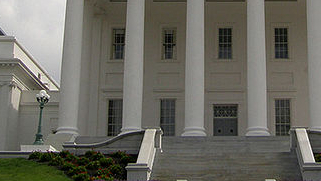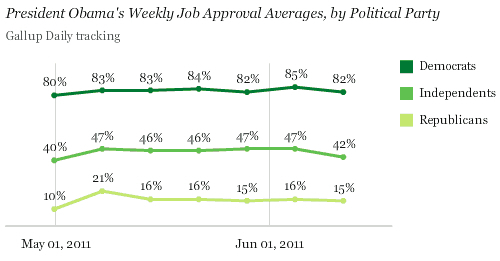Matthew Yglesias's Blog, page 2270
June 19, 2011
Only 15 Percent of Virginia House of Delegates Seats Are Being Contested

Something I should say is that this whole "floors not ceilings" thing with regard to campaign finance reform shouldn't be taken as just something to say in response to calls for contribution limits. Even relatively modest public financing would, if applied systematically, really transform the American political system. Consider, for example, this story about how only fifteen percent of Virginia House of Delegates seats are being contested.
People often discuss uncompetitive seats primarily through a gerrymandering lens, but I think the money is a much more important factor and one that there's a better solution available for. If any major party nominee was guaranteed a decent amount of money, then almost every seat would be meaningfully contestes. Incumbents might still be regularly re-elected (and why shouldn't they be if they're ideologically well-fitted to their districts) but they'd still need to hustle and try and worry that they'll be exposed to scrutiny. The way our system works now, the quantity of meaningful elections is very driven by the imperative to raise funds and then try to allocate them "efficiently" to winnable seats. It leaves us with a needlessly impoverished political debate.


Barack Obama Is Popular With His Base
After hearing a lot of anti-Obama sentiment from speakers at Netroots Nation I was planning to do a post noting how unrepresentative the NN crowd—mostly male, overwhelmingly white—is from the actual base of the Democratic Party which continues to like Barack Obama a lot:

But according to Christina Bellantoni, the best survey we have actually shows that the Netroots Nation attendees mirror this generous assessment of the president:
A straw poll conducted by Greenberg Quinlan Rosner Research showed that 80 percent either approve or strongly approve of the president more than a year before voters head to the polls to decide whether he deserves a second term. The results broke down to 27 percent strongly approving of Obama and 53 percent approving "somewhat." Thirteen percent said they "somewhat disapprove," and 7 percent strongly disapprove of the president.
Nothing earth-shattering. But a reminder that the proximate problem faced by would-be left-wing critics of President Obama is that they generally have much less credibility with the progressive constituency than the president does himself.


Campaign Spending And Broadcast Media
Tom Lee wants to get real about money and speech:
I love philosophical abstractions as much as the next guy, but let's get real: most types of communication are cheap. This is about broadcast media. The money-in-politics discussion is about domination of a small number of more-or-less zero-sum distribution channels, most of which are subject to physical constraints that necessitate a high level of regulation. Your freedom to speak within these channels is already severely limited in both a legal and practical sense.
Well yes and no. Here's where I agree. If we think about campaign finance in terms of floors rather than ceilings, the regulated status of broadcast media suggests ample opportunities to require the disbursement of free air time to political candidates and other things.
Where I disagree is that there's more to campaigning than broadcast media. Field organizing and GOTV aren't free. And I believe broadcast media looks less important when you look away from big national presidential campaigns. Someone mounting a challenge to Peter King on Long Island isn't going to want to rely primarily on purchasing airtime throughout the entire New York City media market. A city council race in DC, similarly, just can't be focused on television advertising.


English Food And The Problem With Inflation
On his RSS feed, Paul Krugman's photo of gourmet mushy peas is accompanied by the tagline "What has happened to English food?"

It reminded me that his old essay "Supply, Demand, and English Food" is one of the great short pieces on economic history. But the short version of the story is that English food has gotten better over time. And so has American food. Part of this you can just see in the range of options available to a diner in 2011. Here in Minneapolis within the relatively small downtown area I've managed to eat some decent Indian food, some Korean BBQ tacos, a great bowl of Pho, and a tasty pizza. These were not cuisines widely available in mid-sized American cities a few decades ago. That kind of rise of "ethnic food" has helped raise quality directly (by being tasty), has helped raise quality indirectly (by providing competition), and in addition the simple fact that a wider range of choices is available constitutes a quality improvement all on its own.
This kind of change in quality is something that the price index data used to compute inflation doesn't really record. But it makes a different in people's lives. Something that's important, though, is that these quality improvement impact different people very differently. For some people, the fact that mid-sized American cities now offer a wide range of ethnic dining options is a meaningful improvement in quality of life. But to the best of my knowledge my grandparents down in Boca Raton have never had a bowl of Pho and don't intend to start. In their subjective experience, if anything the quality of dining options has declined as the sort of red checkered tablecloth Italian-American restaurants they enjoy have become less available.


June 18, 2011
Michele Bachmann Accuses Obama Of Plot To Undermine Single-Payer Health Insurance In America

Netroots Nation is, naturally, full of talk about how President Obama isn't as thoroughgoing a progressive as various people might like. At times this takes the form of very reasonable tactical or policy critique, though at times it reads to me more like a fairly baroque conspiracy theory. Under the circumstances, Michele Bachmann would fit right in with her explanation that the entire health reform drive is a secret plot to undermine Canadian-style single payer health insurance:
"This hasn't been talked about very much – the president's plan for senior citizens is Obamacare," Ms. Bachmann told party activists here. She added, "I think very likely what the president intends is that Medicare will go broke and ultimately that answer will be Obamacare for senior citizens."
Of course there's no literal way to make this cohere with Bachmann's nominal ideological commitments or her recent vote to privatize Medicare. But politics is mostly about identity, and older white people have developed a very conservative ideological self-identity as the rest of the country moves past them in attitudes toward race and LGBT equality. Under the circumstances, adopting a health care politics that's oriented around relentless pursuit of the financial interests of the oldest couple of cohorts of Americans makes sense.


Entrepreneurship And The No-Quit Economy
Matt Cameron wrote a good post yesterday about the toll of high unemployment on the employed majority. When the economy's at or near full employment, then quitting your job is a very credible threat. You, as a worker, have some real leverage over your employer that lets you bargain for better wages or working conditions or find them elsewhere. When unemployment's at 9.1 percent, it's a very different world. Unless you're Dwight Howard, you need your job more than your boss needs you.
Something else to think about is the impact of this no-quit economy on broader economic performance. Some entrepreneurs are guys like Bill Gates or Mark Zuckerberg who start their company right out of school. But I believe the more typical scenario is for someone to be in the labor force for years, compiling savings and getting skills, and then deciding one to quit a meh job at a blah firm and try to strike out on his own. This is, obviously, always going to be a risky undertaking. In particular, a would-be entrepreneur tends to stand to lose a lot of his savings. But in a healthy economy, you can quit your job to start your own business with a reasonable amount of confidence that even if things go sideways you'll be able to return to your old profession and go back to work. With unemployment at 9.1 percent, you really need to think twice about that assumption. The downside risks become enormous, so fewer people do it, so incumbent firms face less competitive pressure and we overall have less innovation.


Barack Obama Will Unleash The Secret Service On His Daughters' Boyfriends
Anna North on Barack Obama, scary dad:
Malia Obama turns thirteen next month, meaning our President will officially be the father of a teenager. He doesn't seem too worried: of his girls, he says, "I have men with guns that surround them often." And thus Obama joins the ranks of the Scary Dad.
According to AFP, Obama has said, "I'm not anticipating complete mayhem for the next four or five years, but I understand teenagehood is complicated." In addition to the guys with guns, he says, "a great incentive for running for re-election is that it means they never get in the car with a boy who had a beer." Also, if Malia does get a beau, "I might invite him over to the Oval Office, ask him for his GPA, find out what his intentions are in terms of career." He added, "Malia, Sasha, if you're watching this, I'm just joking."
The Secret Service thing is the most striking, but I actually think it's the car with a boy who had a beer bit that does the most to highlight the problems here. Obviously, all parents should be worried about their teenage children engaging in drunk driving. This would be an excellent reason for Barack Obama to step up his support for progressive transportation reform, aimed at shifting the United States away from near-exclusive reliance on auto-centric suburban development. Sprawling suburbs are often perceived as an ideal place for child rearing, but this is much less the case when the children in question are drunk and seventeen.
But instead of placing the very real drunk driving problem in the context of alcohol regulation and transportation policy, it's located in a nebulous realm of sexual threat. Why is the drunk car driver a boy? Would it be better for Malia to get in a car driven by a drunk gal pal? To drive drunk herself? There's something very odd about conflating the legitimately dangerous activity of operating a motor vehicle while intoxicated with the completely benign practice of having a high school boyfriend.


Bailout Or Default
It's very difficult to understand what's supposed to be happening with Greece:
On Sunday, finance ministers from the euro zone will meet in Luxembourg and are expected to approve the next dispersal of aid. But if Mr. Papandreou fails to push through the new austerity measures that Parliament is expected to begin debating next week — with a confidence vote scheduled for Tuesday following a cabinet reshuffle last week — it could jeopardize the second rescue package that Greece needs in order to carry it through next year. A default would send the euro zone and world markets into a tailspin.
To a first approximation, Greece's problem is that it can't pay the money it owes. When you owe more money than you pay, the normal solution is to not pay the money you owe. If the problem with Greece defaulting is that it would "send the euro zone and world markets into a tailspin" then it seems like the euro zone (or "world markets") have a strong interest in bailing Greece out so as to avoid the default scenario. The idea of austerity seems nearly irrelevant to this calculation. Money was loaned to Greece at German-style interest rates. That can't have been based on the assumption that the Greek economy was the same as the German economy or that Greek governance is the same as German governance. It must have been based on the assumption that in the event of a crisis the European Union would move to fiscal integration, since the system is unworkable without it. Now we either need to move to fiscal integration (bailouts, guarantees, etc.) or to unwind the system (defaults, runs, and countries forced to reintroduce devalued national currencies).


Campaign Finance As A Floor Rather Than A Ceiling
It seems utopian to even be thinking about such things, but I want to register agreement with Jonathan Bernstein that much better than futile efforts to restrict the use of money in politics are efforts to use public financing to guarantee the existence of a financial floor that ensures that legitimate candidates have some chance to get a campaign off the ground without needing to do oodles of fundraising:
If I had my ideal system, I'd probably give House major party nominees some substantial amount of public financing ($500,000? $1/constituent? $1/voter?), come up with a similar formula for the Senate, enforce strong disclosure rules on top of that, and call it a day (actually, I'd also keep the current system for presidential elections, with the assumption that no serious nomination candidates or major party nominees will ever use it, but just in case). You want to drop $10M into a House district? Fine. You're going to waste most of it, and the opposition can run against some outsider trying to tell the locals how to vote (you better make sure opposition research won't turn up anything about you), and that's the end of the story, as far as I'm concerned.
One thing to note about this proposal is that it would probably do more than a million googoo anti-gerrymandering proposals to increase the number of meaningfully contested House races. No matter how you draw a district, there's always a median voter and thus always in principle a way to beat the incumbent. But challengers all suffer at a major financial disadvantage and parties want to concentrate their fundraising efforts on the friendliest districts. That gives too many incumbents a too comfortable time.


June 17, 2011
The Not-So-Fearsome Windmill Lobby

Even friendly causes like clean energy have corporate money behind them, but is it really true as Lamar Alexander implies that "Big Wind" is a major influence on public policy? Sarah Laskow :
The [American Wind Energy Association] did contribute more to political candidates than any other renewable group from 2009-2010, but the group's giving totaled just $338,348, according to the Center for Responsive Politics. Compare that to the biggest player in the oil and gas industry, Koch Industries, which gave just under $1.9 million or more than five times what AWEA had to offer. The alternative energy industry, as a whole, spent $31 million on lobbying last year; the oil and gas industry spent $145 million.
It seems to me that the main problem here is that not only do the dirty energy and clean energy lobbies not offset, but the competition between them tends to suck oxygen away from the opportunity of simply using less energy. Obviously, nobody wants to live in a world without electricity but there are huge potential gains from conservation that tend to have almost no political voice at their back.


Matthew Yglesias's Blog
- Matthew Yglesias's profile
- 72 followers



